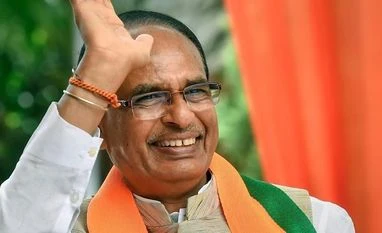As campaigning for the Madhya Pradesh assembly elections rises to a fever pitch, witty slogans and catchphrases that have the ability to travel far and wide, particularly in the age of social media, do not seem to dominate the discourse as they did in earlier elections.
Maaf karo Maharaj, hamara neta Shivraj' (sorry Maharaj, our leader is Shivraj) was a big hit in the 2018 state polls when the BJP targeted Jyotiraditya Scindia, a scion of erstwhile Gwalior royalty who is affectionately called Maharaj' by his supporters.
With changing political equations following Scindia's switch to the BJP in 2020, which led to the collapse of the Kamal Nath-led Congress government in MP, the saffron party's favourite slogan underwent a tweak.
When Scindia joined the BJP on March 11, 2020, Chief Minister Shivraj Singh Chouhan wrote on X (then Twitter), Swagat hai Maharaj, saath hai Shivraj (welcome Maharaj, Shivraj is with you).
BJP brains had coined Shriman Bantadhar (Mr Spoiler) for former Congress CM Digvijaya Singh in 2003 to highlight potholed roads and erratic power supply in the state, which they claimed were the worst in the country.
In 2003, only potholes existed in the name of roads across the state. Power supply was extremely erratic and Digvijaya Singh used to say that elections are won by management and not by development. People were facing problems on every front. Such a situation was aptly summed up by naming him Shriman Bantadhar, said state BJP secretary Rajneesh Agrawal.
The BJP leader said that campaigning through slogans has now moved from paintings on walls to social media.
Also Read
Now, sloganeering has reached social media unlike earlier days when campaigning meant wall paintings with catchphrases, though traditional politicking still existed, he said
The result was that the tally of the Congress, the ruling party in 2003, was reduced to 38 in the 230-member house and the BJP under Uma Bharti emerged victorious with 173 seats, he said.
Even after two decades, BJP stalwarts like Prime Minister Narendra Modi and Home Minister Amit Shah have used Shriman Bantadhar in 2023 to refer to the state's condition during Digvijaya Singh's tenure (1993-2003).
In this election, the BJP calls MP Congress chief Kamal Nath CorruptionNath, while the Congress has hit back with Shivraj ka mission, 50 pratishat commission (Shivraj's mission, 50 per cent commission) to accuse the ruling party of rampant corruption in the state.
The Congress also came up with many slogans like Badhaiye hath, fir Kamal Nath, BJP hatao, samman bachao and 50% commission ki sarkar, isiliye yuva berojgar.
PM Modi also used to say Gareeb ki jeb saaf aur kaam half at his rallies.
However, no slogan in this election became as popular as last time's Maaf karo Maharaj, hamara neta Shivraj, said political observers.
It could also be due to the fact that the BJP did not project any CM face in Madhya Pradesh. It has come up with MP ke mann mein Modi, Modi ke mann mein MP. In this election, the PM himself speaks half of this slogan, while the remaining half is uttered by the public.
Senior journalist and political commentator Rasheed Kidwai said that catchy slogans tend to help campaigners drive home the key points effortlessly.
..but slogans also have a history of boomerang. Maaf karo Maharaj' was used effectively against Jyotiraditya Scindia in 2018 but in 2023, Scindia's Maharaj tag is back with another slogan. BJP opponents are dubbing the party carrying three factions Shivraj, Maharaj and Naaraz (disgruntled)', Kidwai said.
MP Congress Media Department chairman KK Mishra said the BJP's "costly" advertising campaign with the fake catchphrases in the state has ended the credibility of slogans.
Slogans have lost their relevance and credibility in the past 20 years in Madhya Pradesh due to the BJP. Our only slogan is Bhrashtachar ke khilaf, waqt hai badlav ka' (time for a change against corruption), he said.
Senior journalist and political commentator Girja Shankar attributed the changing landscape of slogans to the commercialisation of the creative space.
The intellectuals who used to be associated with political parties for creating campaign slogans are now being replaced by consultant companies. Slogans used to have an emotional touch but the role of intellectuals has been eliminated, he said.
Over the last few years, Shankar said, communication of political parties with intellectuals and litterateurs has come to an end.
Earlier, the people with literary interest would write slogans, which appealed to the masses, said Shankar. Citing the examples of Sinhasan khali karo ki janta aati hai' or Jaat par naa baat par mohar lagegi hath par, Indira ji ki baat par, he said such people are now out of the electoral process.
The senior journalist said this estrangement is also evident as politicians have lost maryada' (decorum) in their speeches in Parliament or outside.
On the other hand, the political discourse in Madhya Pradesh drew heavily on popular characters like Jai-Veeru' and Gabbar Singh' of iconic film Sholay and Shyam' and Chhainu' of Mere Apne', with politicians drawing parallels through them.
Political dialogues and references in this election also included references from epics Ramayana and Mahabharat.
Polling for 230 seats of Madhya Pradesh assembly is scheduled to be held on November 17.
(Only the headline and picture of this report may have been reworked by the Business Standard staff; the rest of the content is auto-generated from a syndicated feed.)




)